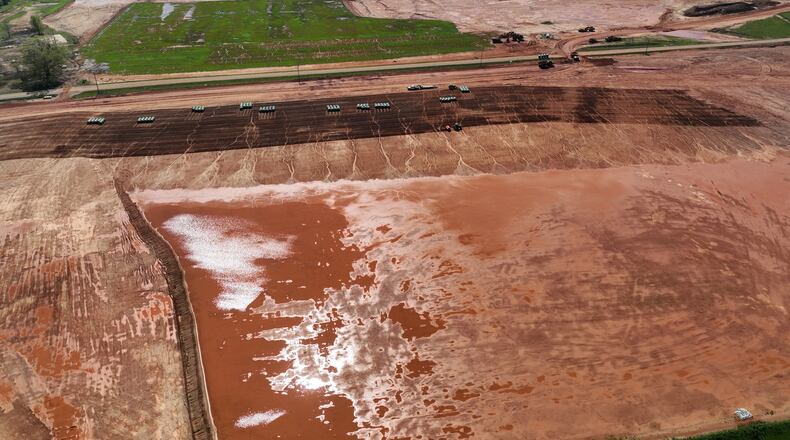Editor’s note: This story has been updated to clarify aspects of certain litigation involving the factory site.
Rivian and two contractors enlisted to clear and grade land for the company’s $5 billion EV plant an hour east of Atlanta are being sued in U.S. District Court by a nearby resident who claims muddy runoff from the site has choked streams and ponds downstream in violation of federal environmental law.
The filing presents yet another potential legal hurdle for the California-based EV startup, which has faced stiff resistance from some local residents since announcing plans to build a factory among the farms and forests of Morgan and Walton counties a year and a half ago.
The complaint was filed last week in the Middle District of Georgia by Julie Jenkins of Morgan County, who oversees a family trust that sold some of its land to the state for the Rivian project. She and her family still own other properties near the 2,000-acre site of the future factory.
“I do not have a problem with electric vehicles or economic development in appropriate places if done in a good way,” Jenkins said in a statement. “However, Rivian and the contractors working on this project have shown disregard for the environment of our rural area, including our fields, forests, and streams.”
In addition to Rivian, the complaint names Thomas & Hutton, an engineering firm with offices across the Southeast and Austell-based Plateau Excavation Inc., as defendants. Thomas & Hutton created a sediment control plan for the project and Plateau is conducting the actual grading of the site.
The problems allegedly began last October, shortly after Plateau began clearing a 737-acre portion of the site to serve as a pad for the Rivian plant. A rainstorm early that month sent mud from the site spilling into Rawlings Branch, a stream connected to the Oconee River. Farther downstream, Rawlings flows onto the Jenkins’ property and as a result, the suit claims the family’s land was left a muddy mess.
Plateau self-reported a dirt discharge from that October storm and the Georgia Environmental Protection Division (EPD) later issued a notice of violation against the company for beginning grading before adequate sediment controls were in place, but they were not fined. The notice said Plateau took steps to remove mud that had escaped from the site from waterways and stabilized perimeter fencing in the aftermath.
EPD records show the agency has continued to receive complaints about runoff from the site. In the time since, EPD staff have made several visits to the site to investigate, but no new citations have been issued.
The lawsuit says that heavy precipitation events continue to send more mud into Rawlings Branch and onto the Jenkins’ property. And because Rawlings Branch is a perennial stream qualifying as “waters of the United States,” the complaint claims the runoff pollution constitutes a violation of the federal Clean Water Act. The filing also alleges a retention pond on the site that was converted to help control runoff breached the underlying groundwater recharge area and is also contributing to the pollution issues downstream.
The lawsuit claims Rivian has been aware of the issues since last December and that neither it nor the other companies involved have bolstered their sediment controls.
A Rivian spokesperson declined to comment on the filing, citing company policy. Requests for comment from Thomas & Hutton and Plateau were not immediately returned.
This isn’t the first time concerns have been raised about sediment runoff since grading began. Residents living nearby have reported swimming pools and drinking water wells that were clogged with mud, which they claim came from the site of the future EV factory.
Other lawsuits related the factory, though ones that do not name Rivian as a defendant, could affect the project’s trajectory.
Last week, a judge handed the project a victory of sorts in a separate case when it ordered Rivian opponents to pre-pay state and local economic development authorities’ legal fees to continue litigation challenging rezoning for the plant.
In a separate legal battle, the state and the Joint Development Authority (JDA) of Jasper, Morgan, Newton, and Walton counties are asking an appeals court panel to reinstate some $700 million in local tax breaks — a critical part of the economic development deal Rivian signed with the state — that were struck down by a local judge. Regardless of how the panel rules, the case is likely to be appealed again to Georgia Supreme Court.
Rivian can terminate its agreement with the state and JDA in May if the local tax breaks aren’t approved.
As recently as last week, Rivian officials indicated the company remains committed to building its second factory in Georgia and its CEO, R.J. Scaringe, has said Rivian’s goal of “scaling and growing really relies on the future of this project.”
Cox Enterprises, which owns The Atlanta Journal-Constitution, holds about a 4% stake in Rivian.
About the Author
Keep Reading
The Latest
Featured


